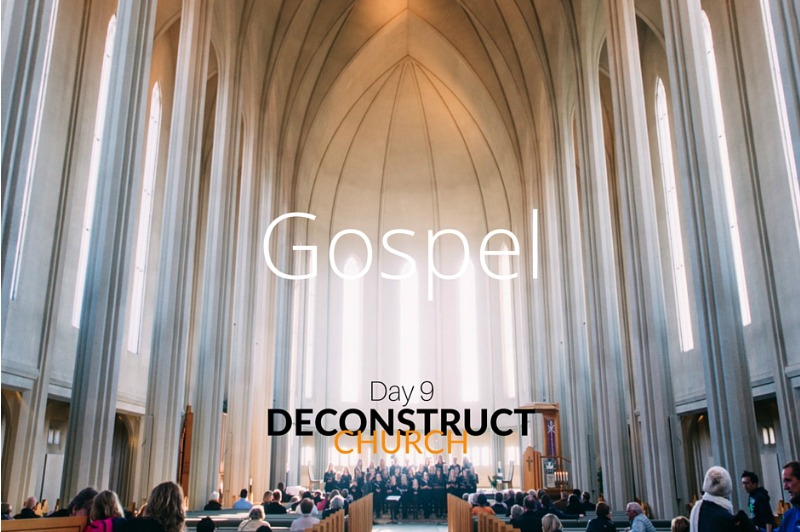I first really heard the gospel in school.
I was in an undergrad Bible class on Paul; the kind of distributive requirement that seemed like a natural fit for me. English major; PK (priest’s kid). The professor was an Orthodox bishop, Makarios. And his thick Indian accent meant that we had to really listen. Listen to him talk about the Paul of tradition, outside the text. But it wasn’t Paul that got to me, it was Peter.
As the Bishop told it, we learned of these two, hunted, at one brief time together, both are caught. And while Paul faced his demise, Peter escaped, preserving his own life. It was then that Peter realized that he had just done it again. He had denied Jesus 3 times on Good Friday and now, years later, was denying him once again. He refused to continue this habit. So when he was arrested and ultimately set to be executed, Peter requested to be crucified upside down: to kiss the feet of his Lord.
 'In him I could see Christ.' Click To Tweet
'In him I could see Christ.' Click To Tweet
The story got to me. It got to me in spite of my rational side. In spite of the ahistorical nature of tradition. In spite of what I couldn’t know about this moment. I knew this was true. I knew that this was how I was feeling. I knew Peter was just like me.
The other way I heard the gospel in that class was in the Bishop’s personal stories. Of his generosity, of his working with suffering students, the personal sacrifices he made. In his truly open character. In him I could see Christ.
Encountering the Gospel
The devout know this to be true of the gospel. We know that the gospel is about living; not merely the words on the page. Our trouble actually seems in blending the two.
The Gospel or the “Good News” is not only the story about Jesus, but it is Jesus. We have four books in the Greek Scripture we shorthand into “the gospels”, but there is only one gospel. We struggle articulating this truth. Our language is neither precise enough or simple enough to handle it.
These four books are different. Not because they are four different witnesses of the same event, therefore giving us four different “accounts” of that event, pursuing the singular objective reality. But they are four attempts to proclaim the gospel as they have been received in four different communities by four different people several decades after the events depicted.
Mark, the earliest one, opens with “The gospel according to Mark.” It is out of laziness or rushedness that we call this Mark’s gospel, for it is not his to possess nor is the gospel a singular book / event / historical reality.
The Gospel is Jesus and Jesus is encountered. Perhaps then we should refer to these books not as accounts, but as encounters. That each is in itself what Caputo or Derrida might call an event which points us to Jesus, whose incarnation / crucifixion / resurrection was the primary event in our understanding of GOD’s relationship to humanity.
Ask Yourself
How do I understand the gospel? What is my story of encounter?
What is my congregation’s encounter story? My denomination’s? Our church’s? Or, more precisely, what are our many encounter stories? And what is our present story?
How is the gospel presented and understood in my community? Do we speak of the books, the stories of Jesus only or do we speak of encounter? In some traditions, we are more interested in speaking about Jesus than being like Jesus or revealing Jesus to one another. When does my tradition do this?
Is the gospel actually present in our worship? This isn’t a snarky question, by the way, or a judgy one. Is the gospel spoken of or is it something revealed? How is the gospel made manifest in our liturgical life?
How might we share and engage this sense of encountering Jesus more fully in all of our gatherings: our worship, fellowship, meetings? How might we encounter Jesus in our work?
In what ways does our worship not facilitate an encounter? Or in what ways is it attempting to? Through beauty or emotion or intellect? Through guilt or pressure? Through expectation or charisms such as healing or speaking in tongues? Through music or ritual prayer forms? What are my tradition’s preferred methods and how do they align with mine? Where do they differ?
What would our worship look like if we made intentional this sense of the encounter; that it can be our primary focus? What does this do to our existing worship forms and traditions? How might these parts of our worship be rehabbed or reborn to be such encounters for the people?
How might we serve one another and help those around us encounter the gospel? What can we do? Who can we be, that Jesus is encountered through us? What if we all did that? And isn’t that actually what the gospel tells / compels?
[This is Day 9 of How to start deconstructing church. The next in the series is “Preach”. To start from the beginning, read the introduction here.]

Leave a Reply